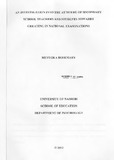| dc.description.abstract | National examinations are used in selection and placement because they are valid and reliable. However, examination malpractices remain a major challenge to all examination bodies of different countries all over the world. National examinations have been used in Kenya for many years as instruments for further education and training. In the review of the literature, different authors and researchers have described the meaning of examination malpractices and the different methods that students use to cheat in examinations. Examination malpractice has been perceived differently and students do not see it as a wrong practice. It is however brought to light that examination malpractice is an indication of a decline in the quality of education and affects the national development of a country. This study intended to find out the attitudes that teachers and students have towards cheating in national examinations with a view to establishing the different ways that can be used to curb the malpractices. The study involved 362 students in which, 178(49.2%) and 184(50.2%) were male and female students respectively. The study also interviewed 30 teachers whereby 23(76.7%) were males and 7(23.3%) female teachers. The respondents varied in their age, school category and school location. The overall findings revealed that out of the 392 respondents 219(60.5%) of the students would not mind cheating in a national examination given an opportunity and 17(56.7%) of teachers would also not mind if cheating was done in the national examinations. The study established that female students' likelihood to cheat in a national examination was 48% more compared to male students. It was found that a student in a district school and a provincial school was 2.154 and 2.890 times respectively, likely to cheat compared to one in a national school. To reduce cheating, 50% of the respondents suggested that students should work hard, 69% said that they should employ peer counseling while 38% stated that coverage of syllabus on time would help to curb cheating.
Some of the highly suggested measures included taking strict measures against those found cheating; this was cited by 41% and 13% of the students and teachers respectively. Integrity was suggested by 23% and 25% of the students and teachers respectively as a way to reduce and eliminate cheating in national examinations. Among the others suggested included thorough frisking, banning mobile phones in schools and enough text books. | en_US |



